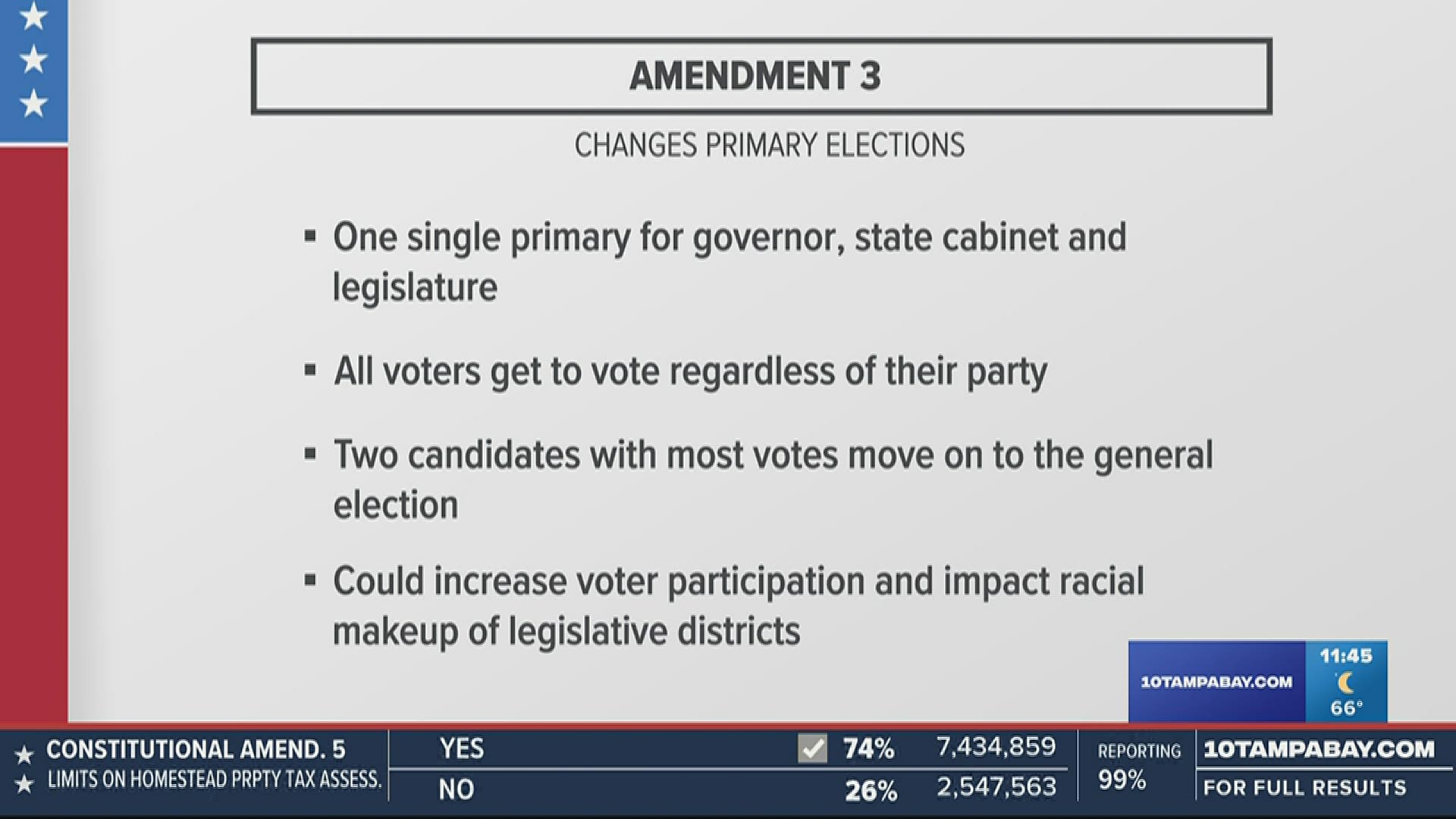Voters in Florida can make six changes to the state’s constitution this election year.
Those front-and-back ballots mailed out or passed out at the polls had more than just candidates running for office, judges and school issues. Six amendments were worth consideration, too, each effectively giving voters the power to change how the state functions with simply a “yes” or a “no” vote.
Four amendments – No. 1 through No. 4 – were by citizen initiatives, meaning the amendment was introduced by Floridians through a petition process to get onto the ballot. Lawmakers were bypassed; voters decide whether the amendment becomes part of the constitution.
The other two – No. 5 and No. 6 – were introduced by members of the Florida Legislature.
An amendment passes when it receives at least 60-percent approval from voters.
Scroll down to see the latest results for each amendment:
Florida Amendment 1
Summary: “This amendment provides that only United States Citizens who are at least eighteen years of age, a permanent resident of Florida, and registered to vote, as provided by law, shall be qualified to vote in a Florida election.”
RESULT: With more than 60-percent of voters approving, the Florida Constitution will be changed to say “only a citizen” of the United States who is at least 18 years of age and is a permanent resident of the state can vote.
Florida Amendment 2
Summary: “Raises minimum wage to $10.00 per hour effective September 30th, 2021. Each September 30th thereafter, minimum wage shall increase by $1.00 per hour until the minimum wage reaches $15.00 per hour on September 30th, 2026. From that point forward, future minimum wage increases shall revert to being adjusted annually for inflation starting September 30th, 2027.”
RESULT: With more than 60-percent of voters in approval, the state’s minimum wage will increase to $15 an hour by September 2026.
Florida Amendment 3
Summary: “Allows all registered voters to vote in primaries for state legislature, governor, and cabinet regardless of political party affiliation. All candidates for an office, including party nominated candidates, appear on the same primary ballot. Two highest vote getters advance to general election. If only two candidates qualify, no primary is held and winner is determined in general election. Candidate’s party affiliation may appear on ballot as provided by law. Effective January 1, 2024.”
RESULT: With less than 60-percent of voters in approval, Florida’s system of primary elections for state legislatures, the governor and cabinet members will stay the same.
Florida Amendment 4
Summary: “Requires all proposed amendments or revisions to the state constitution to be approved by the voters in two elections, instead of one, in order to take effect. The proposal applies the current thresholds for passage to each of the two elections.”
RESULT: With less than 60-percent of voters in approval, the process for amending Florida's constitution won't change.
Florida Amendment 5
Summary: “Proposing an amendment to the State Constitution, effective date January 1, 2021, to increase, from 2 years to 3 years, the period of time during which accrued Save-Our-Homes benefits may be transferred from a prior homestead to a new homestead.”
RESULT: With more than 60-percent of voters in approval, homeowners have up to three years to transfer “Save Our Home” benefits.
Florida Amendment 6
Summary: “Provides that the homestead property tax discount for certain veterans with permanent combat-related disabilities carries over to such veteran's surviving spouse who holds legal or beneficial title to, and who permanently resides on, the homestead property, until he or she remarries or sells or otherwise disposes of the property. The discount may be transferred to a new homestead property of the surviving spouse under certain conditions. The amendment takes effect January 1, 2021.”
RESULT: With more than 60-percent of voters in approval, the surviving spouse of a deceased veteran could receive a homestead property tax discount transferred to them.
RELATED: Surviving spouses of veterans will be allowed to receive homestead property tax discounts in Florida
LIVE ELECTION RESULTS HERE.
What other people are reading right now:
- Watch live coverage of the 2020 election
- Find live 2020 election results
- What to expect on election night 2020: 3 ways this year could be different
- Crunching Florida’s early vote turnout: What does it reveal heading into Election Day?
- What you need to know about the 6 constitutional amendments on Florida ballots
- Live updates: 2020 Election races around the country
►Breaking news and weather alerts: Get the free 10 Tampa Bay app
►Stay In the Know! Sign up now for the Brightside Blend Newsletter

